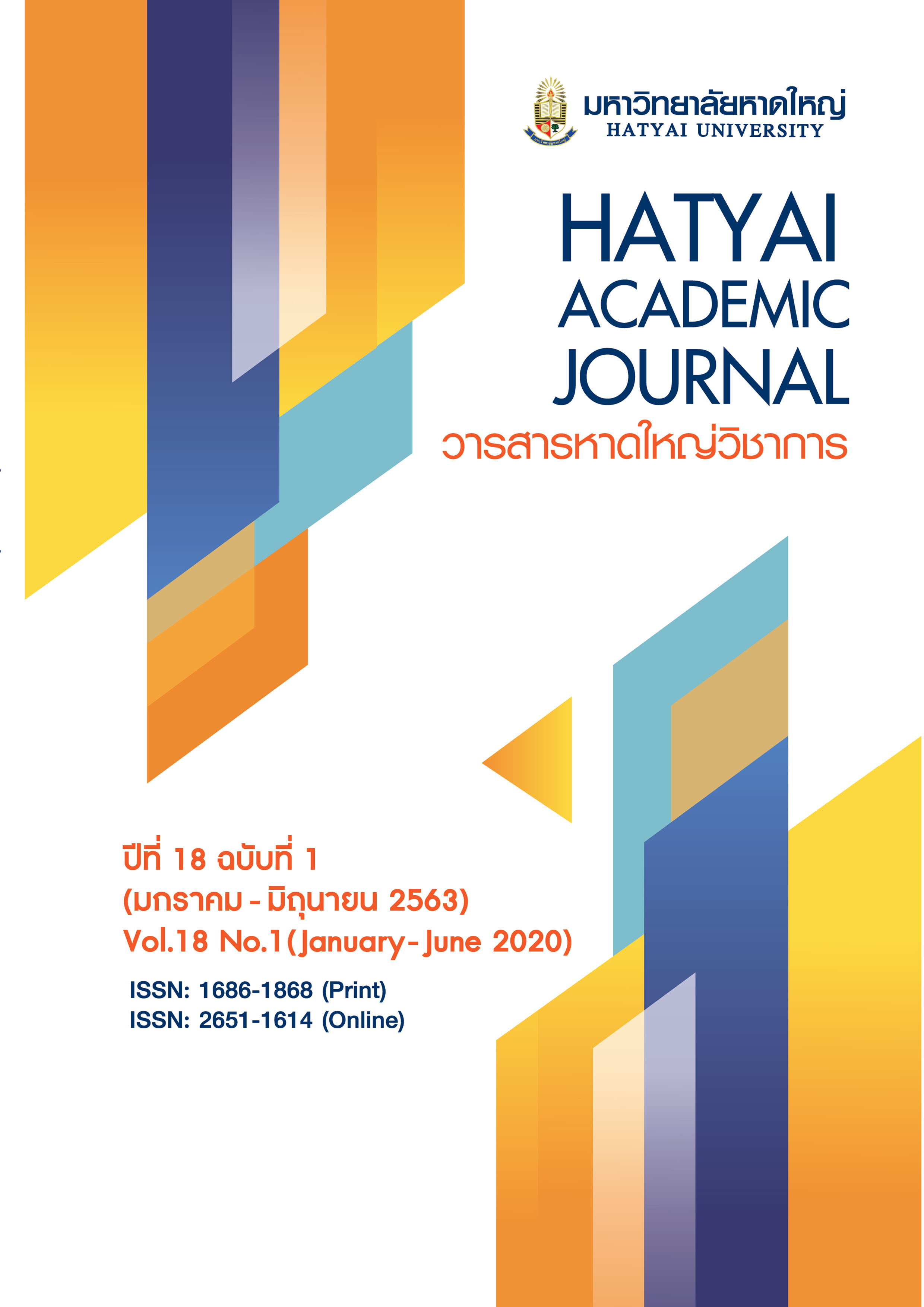Multicultural Leadership of School Administrators in Multicultural Education Management for Early Childhood Education in Southern Thailand Border Provinces
Main Article Content
Abstract
This qualitative research aims to examine the multicultural leadership of school administrators in multicultural education management for early childhood education in Southern Thailand border provinces. The total number of key informants was 56 including 15 school administrators, 15 teachers, five supervisors, five parents as well as eight experts who joined in connoisseurship and eight scholars from 11 elementary educational service area offices in Southern border provinces who participated in a focus group discussion. All informants were recruited using purposeful selection. Research tools were comprised of semi-structured interview protocols, and record lists of connoisseurship and a focus group discussion. Data were analyzed following the approach of the grounded theory.
This study found that the multicultural leadership of school administrators were classified into seven characteristics: 1) planning for directing educational management according to its contexts and society, 2) possessing multicultural communication skills, 3) possessing community relations skills, 4) building cultural organizations to promote acceptance, understanding, and co-existence in a diverse society, 5) building a climate of co-existence in a diverse society, 6) promoting engagement with other sectors, and 7) being a good role model. In addition, the research also found that the experts and scholars confirmed that the seven characteristics of multicultural leadership were appropriate, significant, and essential for multicultural education management for early childhood education in the area.
Article Details
All published articles are evaluated by three qualified peer reviewers from various institutions through a double-blind process, where reviewers do not know the authors’ identities and authors do not know the reviewers’ identities. The content and articles in the Hatyai Academic Journal reflect the authors’ views only and are neither the opinions of the editorial board nor the responsibility of Hatyai University. The Editorial Board of the Hatyai Academic Journal allows articles to be reproduced for academic purposes, on the condition that the original source is clearly cited.
References
Aldridge, J., Calhoun, C., & Aman, R. (2000). 15 misconceptions about multicultural education. Reprinted from Focus on Elementary, 12(3), 1-6.
Banks, J. A. (2001). Cultural diversity and education: Foundations, curriculum, and teaching. Boston: Allyn and Bacon.
Banks, J., & Banks, C. (2010). Multicultural education: Issues and perspectives (7th ed.). New York: John Wiley & Sons.
Brooks, M., & Sungtong, E. (2014). Leading in conflict zones: Principal perceptions of armed military guards in Southern Thai Schools. Planning and Changing, 3/4(45), 356-380.
Chuanchuen, S. (2012). Multicultural education in three Southern Border Provinces: Choice or survival. Academic Journal Faculty of Humanities and Social Sciences, 8(2), 123-136. [in Thai]
Creswell, J. W. (1998). Qualitative inquiry and research design: Choosing among five traditions. Thousand Oaks, CA: Sage.
Da-oh, A. (2008). Is multicultural teaching in the three Southern Border Provinces really necessary. Retrieved from http://www.saengtham.com/collum5.pdf [in Thai]
Gardiner, M. E., & Enomoto, E. K. (2006). Urban school principals and their role as multicultural leaders. Urban Education, 40, 560-584.
Gollnick, D. & Chinn, P. (1990). Multicultural education in a pluralistic society (3rd ed.). New York, NY: Macmillan Publishing.
Heckman, J. J. (2011). The economics of inequality: The value of early childhood education. American Educator, 35(1), 31-35.
Kavanaugh, A., Carroll, J. M., Roson, M. B., Zin, T. T., & Reese, D. D. (2005). Community networks: Where offline communities meet online. Journal of computer-Mediated Communication, 10(4), https://doi.org/10.1111/j.1083-6101.2005.tb00266.x
Mangkalasiri, N. (2017). Multicultural leadership of school administrators under the educational service area office secondary education in Bangkok (Research report)., Bangkok: Dhurakij Pundit University. [in Thai].
Ministry of Education. (2017a). Curriculum of early childhood education B.E. 2546. Bangkok: Khurusapa Publishing House Lat Phrao. [in Thai]
______. (2017b). Educational development plan of the Ministry of Education No. 12 B.E. 2560-2564. Bangkok: Office of the Permanent Secretary, Ministry of Education. [in Thai]
Moran, R. T., Harris, P. R., & Moran, S. V. (2011). Managing cultural differences: Global leadership strategies for cross-cultural business success. Boston: Elsevier.
Morote, E., (2010). A reliable survey to measure teachers’ multiple awareness to their school environment. The Journal of Multicultural Education, 5(1), 1-13.
Office of Coordination of Performance and Royal Affairs. (2012). The principles of development under the royal initiative are understanding, accessing, developing as a 3-step ladder to success. Retrieved from http://www.treconwebsite.com/royalprojects/index.php?option=com_content&view= article&id=102 [in Thai]
Office of the Minister. (2017). Press release summarizing the results of the 6 months and prepare to drive according to the strategic plan, The study of Southern Border Provinces for 20 years. Retrieved from http://www.moe.go.th/websm/2017/mar/164.html [in Thai]
Pang, O. U. (2001). Multicultural education: A caring centered Reflective approach. New York: McGraw-Hill.
Patton, M. Q. (2002). Qualitative research & evaluation methods (3rd ed.). Thousand Oaks, CA: Sage.
Rice, P. L. & Ezzy, D. (1999). Qualitative research methods: Atlantic health focus. South Melbourne, Victoria: Oxford University Press.
Saengarun, B., Tharathornsiri, P., Lietrakul, S., & Yawiraj, P. (2015). Problems and guidelines management of basic education institutions in a multicultural society along the Upper Northern Border. Journal of Education Mahasarakham University, 9(3), 66-77. [in Thai]
Sompong, T., Niemthes, W., Sungtong, E., & Choosuwan, R. (2016). School administration for a multicultural society in three Southern Border Provinces. Hatyai Academic Journal, 14(1), 97-107. [in Thai]
Songkitipisarn, M. (2013). Factors affecting the effectiveness of basic school management Secondary schools in the Southern region of Thailand (Doctoral dissertation). Ramkhamhaeng University, Bangkok. [in Thai]
Strauss, A. L., & Corbin, J. (1990). Basic of qualitative research: Grounded theory procedures and techniques. Thousand Oaks, CA: Sage.
Sungtong, E., Chonphracha, S., Rutsadawong, K., & Sumkoed, C. (2012). Policy formulation and the implementation of the multicultural education school policy into practice: A case study of Samakkhi Municipality School Pattani Province (Research Report). Pattani; Southern Institute of Health Research and Development. [in Thai]
Suwanmanee, S. (2015). School administration for a multicultural society in three Southern Border Provinces: A case study of a public secondary school (Research report). Songkhla: Thaksin University. [in Thai]
Wasi, P. (2014). Apiwat Learning to the turning point in Thailand. Bangkok: Mata. [in Thai]


